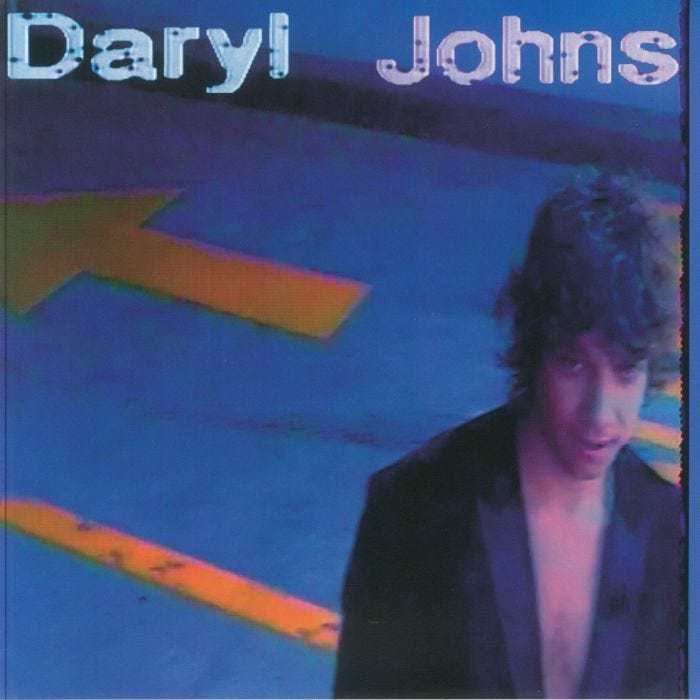You Can’t Call Me Almanac: #1
The inaugural inquisition into all things screen, sound, and story by a hack-of-all-trades journo.
An author’s self-indulgent preamble: After a few years away from the world of entertainment journalism for one reason or (fifty others), this newsletter marks my first tentative steps back into a realm I’ve always loved: one filled with the films, music, and stories that shape our culture — and my attempts to connect all of that with something bigger than the thoughts in my own head.
In truth, my confidence may have faltered — there have been more article pitches entombed in drafts than I care to admit — but my passion for dissecting and writing about everything I consume remains as steadfast as ever. Things aren’t what they used to be, and perhaps I’m not either —but it’s something.
To everyone reading this first edition: thank you. Whether you stumbled across this by chance or are here out of sheer curiosity, your time and attention mean a lot to me.
Also if this lands in promotions or — heaven-forbid — your spam folder I’d appreciate it if you could indicate to Gmail that you’d like it to be sent to your primary inbox, for the sake of the all-knowing algorithm.
So yeah, I guess with all that out of the way, here are some of those thoughts I’ve promised:
Film
Carry-On
A sloppy, trope-laden quasi-Christmas thriller with an interesting angle on evil in the modern world.
In “Carry-On”, we encounter a striking illustration of an unsettling truth: evil, far from being a grand spectacle, often resides in the mundane, the banal, the everyday. Jason Bateman's character (ambiguously named traveler) embodies this disquieting reality — a man in casual clothes, shaggy hair framing an unremarkable face, devouring airport sushi as if engaged in the most trivial of routines. Yet, in this same moment, with an offhand tone, he casually orders the execution of 200 passengers on a plane. This juxtaposition — the ordinary and the horrifying — reminds us that true horror lies not in the villain's overt monstrosity, but in his utter normalcy.
Renowned Marxist-theorist-slash-cultural-provocateur Slavoj Žižek would probably say that this is where ideology reveals itself most powerfully: when evil does not appear as the demonic "other," but as something integrated seamlessly into the very fabric of our everyday lives. The film’s antagonist does not present as an anomaly or a caricature of evil; he is us, or rather, he functions within the same system of reality we inhabit.
For all the intrigue Bateman and his dynamically dramatic acting chops bring to the proceedings, Taron Egerton manages to cast it aside like precious luggage haphazardly consigned to the hold. His performance cuts an awkward figure throughout the film, universally teetering into overacting during pivotal dramatic moments. His overwrought, hyperactive portrayal feels like a relic from early 2000s thrillers, when subtlety was oft-sacrificed for sweaty desperation.
Adding to this muddle, “Carry-On” seems to strain to be included in the “Die Hard-esque” cultural debate, as though studio executives are attempting to engineer a new “Is it a Christmas film?” controversy. The film’s setting — airports decked in tinsel, fleeting references to the holidays — feels cynically tacked on; a scene where a car flips mid-air to the sounds of Wham!’s Last Christmas is less a clever juxtaposition than a transparent attempt to inject seasonal relevance into an otherwise generic action plot.
In the end, “Carry-On” flirts with the unsettling notion of evil hiding in plain sight, but ultimately falls into the trap of hollow genre clichés and turbulent performances.
Directed by: Jaume Collet-Serra
Rating: 56
Watch it on:
A Real Pain
This cathartic meditation on inter-generational Jewish trauma is already a strong contender to be one of the year’s standout dramedies.
Sometimes it’s hard to endure pain — I’m talking real pain. The kind that follows you wherever you go, the kind that defines your life. Most of us have felt it: a breakup, a family death, or something in your past you can’t seem to shake. This is the pain at the heart of Jesse Eisenberg’s latest directorial and acting effort, “A Real Pain”.
The narrative revolves around two cousins (played by Eisenberg and Kieran Culkin)—one neurotic and introspective, the other effortlessly charismatic and aimless—who reunite after the death of their Grandmother and impulsively book a tour-guided trip to Poland, a journey which is meant to reconnect them with their Jewish roots.
This story doesn’t necessarily break new narrative ground in cinema — Liev Schreiber’s 2005 sleeper-hit “Everything is Illuminated” paints a strikingly similar journey — however, “A Real Pain”’s macabre humour and intricate psychological portraits mean that it should be remembered as the essential film on the subject of retracing your lineage as a Jewish person in the 21st century.
The way in which Eisenberg imbues his script with a seamless dance between tragedy and comedy feels like witnessing a magic trick unfold in front of your eyes. Take the scene, for example, where Benji (Culkin) requests a photo be taken of him “fighting” triumphantly next to a monument commemorating Polish resistance fighters who rose against Nazi occupation in the Warsaw Uprising. He’s immediately chastised by his more reserved cousin, who for obvious reasons finds the idea distasteful. However, the scene takes the most unexpected of shifts, as one by one each member of the (mostly solemn and serious) tour group decide to join him. There’s Eloge - a born-again Jewish man and survivor of the Rwandan genocide - who after admitting he won’t pose with a gun due to being a pacifist, takes up a role as a medic, pretending to bandage one of the statues with a scarf; and the Academic British tour guide who mimics flying into the scene as an RAF fighter-pilot. Benji asks “is it funny?” — to which his cousin replies tentatively “hmm, yeah sure - it’s funny”.
And not only is it funny: it’s one of the most absurdly riotous scenes committed to screen in recent years.
Whilst there are a generous amount of laugh-out-loud moments throughout the script - it’s arguably the handling of the more serious themes of the film where it truly shines. If the above scene will make you cry with laughter — as it did for this viewer — then there’s a distinct possibility you find yourself tearing up again, for altogether different reasons, as the film poignantly explores the differing ways in which the cousins deal with the immutable, gut-wrenching sadness of their family’s history.
This is clearly a deeply personal story for the film’s director and lead, and he tells it with an enormous amount of care — not only avoiding the trapping of using victims of the holocaust as tools for trite sentimentality — but instead choosing to paint a picture where the echoes of their existence are felt through the lives that exist among us now.
With “A Real Pain”, Jesse Eisenberg has undoubtedly cemented himself in the canon of actors who can say more behind the camera than in front of it.
Rating: 85
UK release date: 8th January 2025
Crossing
A touching bifocal narrative gives a rich, literary quality to this empathy-laden drama.
“Crossing”, a film about a Georgian woman and her picaresque companion on a journey to find her transgender niece, brings levity and depth to its central characters in such an effortless way, allowing us to connect with them on a profoundly emotional level. It nimbly avoids maudlin dalliances or bloated sentimentality, and even though the last chapter could come off as somewhat contrived, it still manages to deliver a satisfying cinematic journey.
“Crossing”, much like Sean Baker’s Oscar-buzzed “Anora” (another 2024 release about being lost and found) comes alive due to its vibrant and naturalistic verve for locales, where the bustling and gritty frisson of the Istanbul streets swirl around our protagonists like an effervescent dream. From an acting standpoint, particular praise should be heaped on Mzia Arabuli, who is a magnetically dignified and stoic presence whenever she is on screen.
The film thoughtfully interrogates the motives of those who take flight and, perhaps more importantly, those who seek them. Ultimately, “Crossing” leaves us with the poignant refrain that those who are searching may be the most lost of all.
Directed by: Levan Akin
Rating: 81
Watch it on:
Music
Album reviews
Elizabeth A. Carver: The Cart Before The Horse
Freak Folk | Experimental | Avant Folk
Oscillating between lonely piano balladry, freak-folk drones, and somatically embedded bursts of baritone, each track on “The Cart Before The Horse” has a unique sonic identity whilst still maintaining a consistent air of anguish. The musicianship on display is undoubtedly impressive, as each eerily manipulated and strung out instrument (the banjos and bass are bowed not picked) manages to create and explore singular textures — culminating in a memorable few final minutes of noise on the track 'Horse in Retrospect'. It doesn't always work, it isn't always easy, but it's a peculiar oddity that is worth sitting down for if you don’t mind enduring a mournful dirge at a safe distance.
Rating: 66
Listen on:
Daryl Johns: Daryl Johns
Jazz Fusion | Hypnagogic Pop
Coming from Mac DeMarco’s stable of label artists, Daryl Johns’ self-titled album sounds like James Ferraro's 'Far Side Virtual' if it were concerned with Walkmans and VHS players rather than tablets and AI. A really fun outsider, hypnagogic pop album, it suffers—like many albums from this movement—from a lack of focus. However, its smatterings of off-kilter jazz and sunny '80s pop can truly make your heart soar. At its best, it feels akin to the wide-eyed, prismatic world of R. Stevie Moore.
Rating: 72
Listen on Spotify:
Im A Monster: Museum Music
Experimental Hip Hop | Plugg | Cloud Rap
Released under Edward Skeletrix's lesser-known alias, Im A Monster, this second installment in the “Museum Music” series is a lo-fi experiment packed with glitchy quirks and textured production. While its off-kilter charm is undeniable, the album struggles to connect on a deeper level—so much so that revisiting the first entry feels unnecessary. Still, it bursts out of the gates with 'God,' a track which wouldn’t look out of place on the soundtrack of a Safdie Brothers’ movie: smoke billowing, gold grills flashing, the palpable stench of New York accompanying the gritty haze. It’s clear that Im A Monster has a talent for the cinematic and the obtuse, but the mumbled lyrics fall flat on too many occasions to completely surrender to the scenes. I can see some people loving this, others hating; I'm somewhere in between.
Rating: 60
Listen on Spotify:
Track review
Throwing Muses: Summer of Love
It’s been a trifecta of good news for Throwing Muses fans this week with the announcement of their 11th studio album, “Moonlight Concessions”, set for release on March 14, a European tour kicking off in May, and the drop of a brand-new single from the upcoming album.
The single in question, Summer of Love, is a repetitive, pensive, and tightly-wound acoustic track that reveals its intricacies the more you snuggle up with it. The hurried, slipping, and sliding bar chords—iterating insistently throughout—recall the kinetic energy of fellow '80s indie darlings Violent Femmes, while the raw, barbed vocals evoke the haunting intimacy of PJ Harvey's “White Chalk” era.
The lyrics are said to have been “born from a dollar bet with a man who asserted that people’s moods and behaviors shift with the seasons”. If the biting, icy cold refrain of the line:
“Finally life as it should be/ I owe you a buck”
are any indication, it’s evident that lead singer Kirsten Hersh, over time, hasn’t been sold on the promise of seasonal rejuvenation—or, for that matter, the benefits of a solid dose of vitamin C.
Now in their fourth decade of music (a milestone that feels, if anything, a testament to the elasticity of creative endurance) Throwing Muses seem to have embraced a direction that makes their music feel notably less punchy. There is a sense of deliberate restraint here, a tonal narrowing that, while lacking the musical ambition of their earlier catalog, still feels reflective rather than merely reductive. And yet, even in this quieter register, Hersh’s way with words—her uncanny ability to carve vivid landscapes out of the abstract—remains as vital and alive as ever.
Rating: 70
Well, that’s a wrap on the first installment of You Can’t Call Me Almanac. Next week expect more bite-sized film and music reviews, with a TV series thrown in to satiate those binge-hogs out there. Until next week: keep watching, listening and reading!
(and please subscribe if you haven’t already)










